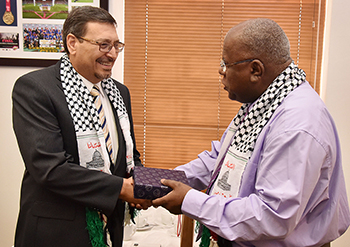Latest News Archive
Please select Category, Year, and then Month to display items
08 April 2021
|
Story Thabo Kessah
|
Photo UFS Photo Archive
 Dr KPD Maphalla with former UFS Chancellor, Dr Franklin Sonn, during the graduations in April 2007.
Dr KPD Maphalla with former UFS Chancellor, Dr Franklin Sonn, during the graduations in April 2007.
The University of the Free State is sad to learn of the passing of alumnus and award-winning Sesotho literary giant, Dr KPD Maphalla.
The literary works of Dr Khotso Pieter David Maphalla, like many other African writers and artists, were influenced and characterised by his own era of powerful forms of oppression and exclusion from dominant literary discourses. In his own right and through his writings of poetry, novels, short stories, and kodiamalla (dirge), he articulated a deliberate political and social protest and pushed for a place for African languages in literature at the height of apartheid.
“He entered the professional scene with his ground-breaking novel, Kabelwamanong, in 1982 at the age of 27. His career actually started in 1971 while he was still at school. Since his first novel, he has produced at least two books annually, covering the genres of poetry, novels, dramas, and short stories. As a dramatist, Dr Maphalla has written a number of excellent and educative radio dramas for the then Radio Sesotho (now Lesedi FM),” said his long-time friend and Head: African Languages at the University of the Free State, Dr Nyefolo Malete.
“It was for this writing prowess that he received recognition from the UFS when he was awarded an Honorary Doctorate in Literature by the Department of African Languages during a momentous ceremony on the Qwaqwa Campus in 2007,” added Dr Malete.
Dr Malete also revealed that, despite losing the use of his right hand after suffering a stroke following a car accident in the late 1990s, Dr Maphalla continued writing using his left hand. “He was adamant that, what he referred to as his ‘supposed disability’, would not deter his passion for writing.”
Dr Maphalla’s work has also produced numerous scholarly studies by the likes of Profs Moleleki Moleleki (protest poetry), Thapelo Selepe (lament and protest poetry), and Dr Seema Seema (process of cross-cultural communication). He was a committed Qwaqwa community member, who was also instrumental in the founding of Qwaqwa Community Radio (2000) and Metjodi Writers (2006), among others. He has written more than 70 books, many of which have been prescribed texts in schools.
Some of the awards he has won include:
South African Centre for Digital Language Resource (SADiLar) Sesotho Lexicographic Unit (Sesiu sa Sesotho) Lifetime Award for outstanding literary works and for promoting Sesotho literature (2019).
The Literature Festival and the University of the Free State Award for enormous contribution to Sesotho literature by a South African writer (2019).
Lifetime Achiever Award in Literature awarded by the Department of Arts and Culture (2005).
M-Net Book Prize for Sesotho poetry (2005). The first and thus far the only Sesotho author to have received this honour.
M-Net Book Prize for best novel (1996).
De Jager-HAUM Literary Award for his volume of short stories, Mohlomong Hosane (1993).
Thomas Mofolo Trophy for Best Novel, Best Poetry, and the Overall Award (1992).
Thomas Mofolo Trophy for Best Poetry (1991).
Dr JJ Moiloa Floating Trophy for Best Sesotho Poetry Book of the Year, Kgapa tsa ka (1985).
Palestinian delegation visit marks new bilateral relations
2015-11-27

Prof Jonathan Jansen and His Excellency Mr Hashem Dajani
Photo: Charl Devenish
|
The Office of International Affairs hosted the official visit of the Ambassador of Palestine, His Excellency Mr Hashem Dajani, to the University of the Free State (UFS) on 16-17 November 2015. Prof Jonathan Jansen, Vice-Chancellor and Rector of the UFS, welcomed the Ambassador and the Palestinian delegation to the Bloemfontein Campus. During the visit, they met with senior management of the university, including Dr Karen Lazenby (Registrar: Systems and Administration), Beata Mtyingizana (Director of International Affairs) and JC Van der Merwe (Deputy Director at the Institute of Reconciliation and Social Justice).
The visit marked the finalisation of a scholarship initiative which offers placement of Palestinian students to study at the UFS. The new Vice-Chancellor’s International Scholarship programme will recognise academic excellence and merit in undergraduate, postgraduate, as well as doctoral academic disciplines.
One of the strategic objectives of the UFS is that of internationalisation, which is strengthened by the scholarship programme. With the focus on Palestine, the university’s international footprint in non-traditional regions of the world, such as the Middle East, will therefore be highlighted.
To conclude the visit, the Institute for Reconciliation and Social Justice hosted a film screening featuring ‘Jerusalem, the east side story’. The documentary mainly looks at the past forty years of Israeli military occupation policies in Jerusalem and the subsequent impact on the city and its people.
“Peace in Palestine is key to world peace,” Ambassador Dajani said. “The issue of self-determination is central to the Palestinian effort, and, through the assistance of the international community, it can it be realised.”